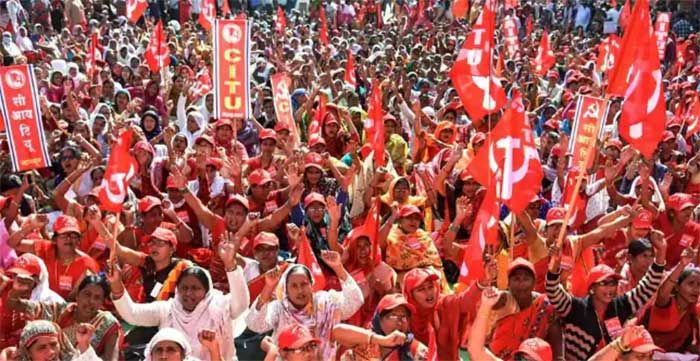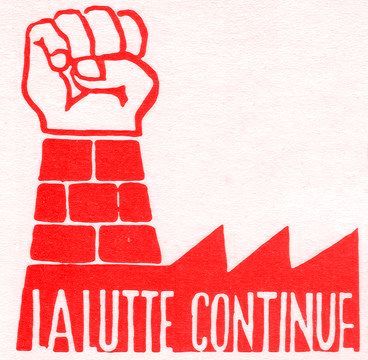Tony Saunois is a member of the Committee for a Workers’ International.

Spanish general election anticipates new upheavals and need for revolutionary socialist alternative
The general election which took place on 28 April in the Spanish state, like elections throughout Europe, at this time, was marked by a deep polarization. The election came on the heel of the revolutionary upheavals which rocked Catalonia in 2016/7 and the shock election victory of the right and the extreme right in regional elections in the former Socialist Party (PSOE) stronghold of Andaluzia. Then the traditional party of capitalism since 1989, the Partido Popular, together with the populist centre right, Cuidadanos, and the extreme right, fascistic, VOX, won a majority and formed the government.
Spain’s right-wing was hoping to capitalize on this and to repeat a similar vote in the general election. Yet their hopes of victory were dashed. The election was a defeat and set-back for the right and far right. For the PP, led by Pablo Casado, it was a disaster. The party suffered its most serious defeat since its formation. It lost 45% the vote that it won in the 2016 elections. In 2016, it won 33% of the vote – this time, it collapsed to a pathetic 16.7%. The number of seats it has in parliament fell from 137 to a mere 66! This was the worst result for the PP in its history! The dramatic fall in support of the traditional capitalist parties has been a feature in many European elections in the recent period – France and Germany, for example. This development reflects a political fragmentation and polarization across Europe. In the Spanish state, the fragmented right-wing vote moved to the right.
A big section of the collapsed vote of the PP went to the newly resurgent far right, fascistic party, VOX, led by Abascal. Although support for VOX was not as high as some polls had indicated, it is a warning that such a party managed to secure 10.6% of the vote and has entered the parliament with 24 seats. This is the first time that an openly extreme right-wing party has entered the parliament since the end of the Franco dictatorship. The centre right populist party, Cuidadanos, led by Albert Rivera, increased its share of the vote from 13.1% and 32 seats to 57 seats and 15.86 of the vote.
The increased turnout and electoral defeat of the right-wing block was undoubtedly the effect of the whip of counter-revolution, especially following the victory of the right-wing in Andaluzia. The prospect of the coming to power of a right-wing reactionary coalition, which would undoubtedly have assumed a repressive character, provoked a backlash amongst the working class, the radicalized middle class and the youth.
At the same time, the victory of PSOE, which emerged as the largest party, offered some limited reforms in this election. Since Sanchez took over as Prime Minister, in 2018, when the former PP Prime Minister Mariano Rajoy lost a vote of confidence, the minimum wage was raised by 22% and public sector workers were given a meagre 2.5% wage rise. This and the promise of some further limited reforms probably increased PSOE’s support amongst a layer. However, attacks on the working class are certain to follow as the extremely ephemeral and shallow economic growth gives way to an even deeper social and economic crisis.
The vast majority of Spanish workers’ and youth have gained nothing from the small weak economic growth of the recent period. Mass unemployment and precarious jobs, especially for the youth, continue to be the reality of life for millions. A renewed era of instability and social upheavals will inevitably follow the election.
PSOE, under the leadership of Pedro Sanchez, managed to temporarily re-conquer its electoral support. It had previously collapsed due to its turn to the right and pro-capitalist policies and also because of the explosive growth of PODEMOS, which emerged from the ‘Indignados’ movement in 2011. From 22.7% of the vote and 85 deputies, PSOE has increased its electoral support to 28.7% and 123 seats. Much of this was a vote against the right rather than a pro-PSOE vote.
However, the gains made were also a consequence of the collapse in support for PODEMOS which mainly transferred to PSOE. The high hopes and expectations which initially existed in PODEMOS and its leader, Pablo Iglesias, have been shattered, as we predicted it would, if PODEMOS did not consolidate a radical left or socialist base, with internal democracy and democratic control of the party.
In 2015 the combined vote of PODEMOS and the Izquierda Unida was over 6 million. Since then, the party has swung further to the right, distanced itself from mass social movements, refused to support the movement for independence in Catalonia, and been run in an increasingly top-down, undemocratic manner by the leadership. In 2016, the PODEMOS/IU vote was just over 5 million. In 2019, its vote fell to 3,732,929! In this election PODEMOS fell from 21.1% to 14.% and from 72 to 42 seats! PODEMOS offered little or nothing to the left of PSOE, much less a radical socialist alternative.
In such a situation why should workers and young people vote for the copy when the real thing, in the form of PSOE, is seen as a more viable option? It has allowed PSOE, which played a reactionary role during the movement in Catalonia for independence, with a program to manage capitalism that will inevitably mean attacking the working class, to rebuild its electoral support temporarily for want of a viable alternative.
PODEMOS lose votes
The swing to the right by PODEMOS and the weakness in its program (which as it was formed was more of a radical populist character, rather than a radical socialist alternative), was always, as the CWI warned, a danger that could threaten PODEMOS’s future as a viable vehicle for the working class to organize a political alternative. The lack of conscious and active participation by the working class in struggle in PODEMOS, and the organisation’s domination by radicalized sections of the impoverished petty bourgeois and semi working class layers, re-enforced these weaknesses.
Failure to offer a radical socialist alternative and revolutionary struggle to break with capitalism, in a period of capitalist crisis and upheaval, will inevitably lead to the type of betrayal that SYRIZA carried through in Greece, leading to a defeat of the Greek workers. This same process has been clearly seen in the Spanish state and with the implosion of PODEMOS before it came to power. This is a stark warning for others on the left, notably Jeremy Corbyn, in Britain.
It now seems PODEMOS is poised to play the same role as the Left Bloc and the Communist Party in Portugal, in propping up the “Socialist”-led government but without offering a radical socialist alternative.
Catalonia
In Catalonia, the right-wing suffered a devastating defeat reflecting the revolutionary movement which had taken place there. For the first time the parties support independence secured a majority. Yet the main electoral beneficiary was the Catalan Republican Left (ERC).
The ERC had an electoral base largely amongst the urban middle class but has now won support amongst sections of the working class. The ERC featured demands for the release of those imprisoned during the independence movement and opposition to repression, which assisted it in increasing its support. Yet its leadership, with no democratic membership control, propped up previous capitalist governments in Catalonia, and voted for cuts budgets. It is not an alternative for the Catalan working class.
The crisis in Catalonia is certain to erupt again – just one of the conflicts to confront the new PSOE government.
The defeat or setback of the right in the elections is a positive development. Yet the victory of so-called “left” parties which do not offer a radical socialist alternative but are defending capitalism, reflects the challenges now facing the working class.
The electoral defeat of the far-right in these elections does not mean that the threat they pose has disappeared. The failure of PODEMOS and others on the “left” to offer a real alternative means that the threat posed by the right can re-emerge during an even deeper crisis of Spanish capitalism which is poised to take place. The lack of a new mass party being built by the Spanish working class, at the moment, can inject contradictions and complications into the explosive situation which exists in the Spanish state. It is a mistake by some on the Spanish revolutionary left to try and bury their heads in the sand and ignore these weaknesses and dangers. To celebrate the defeat of the right and proclaim a “left victory” is not enough. The right and far-right have not gone away. The role of Marxists is not to try and prettify the situation but to assist the working class in reaching the conclusions of the tasks necessary to advance the struggle to break with capitalism and carry through a socialist transformation of Spanish society.
The elections in the Spanish state will open a new era of polarization, struggle and upheaval, in which the working class, youth and others exploited by capitalism will need to build a revolutionary socialist alternative to defend their interests.



